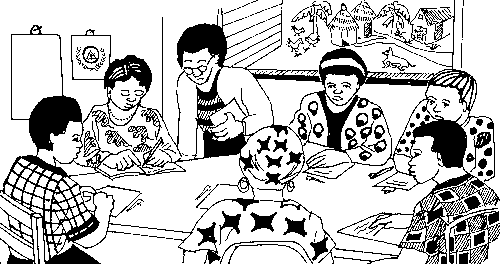Tweet
Translations:
Català
中文 / Zhōngwén
English
Español
Filipino/Tagalog
Français
Ελληνικά / Elliniká
Italiano
Polszczyzna
Português
Română
Српски / Srpski
Türkçe
Other formats:
Other Pages:
Modules
Site Map
Key Words
Contact
Utility Documents
Useful Links
LITERACY AND EMPOWERMENT
Functional Literacy Methods for Community Mobilisers
by Phil Bartle, PhD
Dedicated to the memory of Peter Gzowski*
Workshop Handout
Reading and Writing can Increase the Capacity of a Community
Listening to the members of a community which you are mobilising, you hear that there are members who can not read and write. You observe there is general agreement that if more community members could read and write, then the community would be more empowered. Can you initiate a process of improving literacy in the community?
If you are already trained in techniques of basic literacy or functional literacy, then you are probably trained beyond what is in the content on this web site. You might therefore like to look at this only to compare notes with what you already know, or to be challenged by its unorthodox approaches.
As a community organiser, you are not necessarily expected to know all the sophisticated professional techniques of a literacy expert. There are certain immediate actions you can take, however, much like a first aid person who is first on the scene of an accident. She or he might not be highly trained like a nurse or doctor, but can still take some immediate steps that will be helpful. You do not have to become an expert but, as a mobiliser, you can begin a process that will ultimately lead your community members becoming more literate, and therefore help the community become more strong.
If you do start a small literacy group, keep the following 18 principles in mind and generate, on your own initiative, creative practical ways to put them into action.
Note to Mobiliser trainer: For each of the principles listed below, there is a set of notes. They are available here together in a single large document (Literacy Principles), or as separate, single page handouts (click on each separately). You can use them in various ways. You could use each handout with your group of mobilisers, for a fifteen minute discussion of each, or you could give different handouts to different small groups, and ask each of them to create a little skit or role play to illustrate their selected principle.
- Do not copy orthodox and traditional methods and content (Lit-01);
- Develop your own methods and content based on principles
of empowerment and relevance (Lit-02); - Adults are not children – different approaches are needed (Lit-03);
- Models for teaching should not be taken from schools for children (Lit-04);
- Respect is very important (Lit-05);
- Learning by doing is more effective than by watching or listening (Lit-06);
- Do not aim for high levels of literacy (Lit-07);
- Seek practical communication – do not strive for perfection (Lit-08);
- Emphasise languages and alphabets most commonly used (Lit-09);
- Combine written words with simple pictures (Lit-10);
- Include elementary numeracy early in your teaching plan (Lit-11);
- What is learned must be practical, immediate, and useful (Lit-12);
- Learn and use what is useful and interesting in each community (Lit-13);
- Avoid curricula (content) from orthodox schooling – make your own (Lit-14);
- Avoid traditional, orthodox, useless topics (Lit-15);
- Praise; do not criticise (Lit-16);
- Give opportunities to participants to teach what they learn (Lit-17);
- Guide participants into the awe and enjoyment of discovery (Lit-18).
Notes on all of the above (long document)
To use these methods in designing your own programme of literacy, you need to have faith in yourself, and to be able to resist the experts and the expert textbooks that say "This is the way it must be done." If their only reason to justify doing something their way is that "This is the way it has always been done," then their reasoning is suspect. Better to work from principles (as listed above) and custom design a literacy training programme that is relevant to the particular community, to the interests and members of the community, and to what is interesting, relevant, useful and practical.
As for structure, try this: Do not design and run a "Literacy Class." Climb out of the school box. Instead, run a "Literacy Programme" that has two types of sessions.
The first type can be called a "meeting" where the facilitator and the participants assess needs, plan activities and come back to asses those activities. The second type of session would be a "project" or a "field trip," where activities include writing and reading, and where the topics are simple, relevant, local and practical. This will become more clear as you work through the principles.
For most of your activities that are described and encouraged on this site, your only tools are few and simple:
- » Large blank newsprint to make posters;
- » Masking tape to put them up on walls;
- » Markers;
- » Notebooks; and
- » Pens
If you are a mobiliser from outside, guiding local mobilisers or facilitators, work with them in understanding these principles, and through group work, design your plan (a curricula that includes both contents and methods). Agree on your content and methods, write them down, and discuss them regularly as a group. Practice yourselves, as if you are the illiterate participants, before launching the programme in your target communities. Come back together regularly to report to each other how things are going, provide mutual support, and to identify what problems arose and how they can be solved.
Keep records of what you try, how you do them, and what results from them.
––»«––
Learning How to Read:
 |